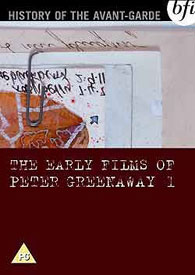 The Early Films of Peter Greenaway: The Shorts compilation includes A Walk Through H (1978), H Is For House (1973), Windows (1975), "Intervals (1969), Dear Phone (1977) & Water Wrackets (1975). Three of these films (Dear Phone, Water Wrackets, & A Walk through H) had previously been released on tape as Peter Greenaway: The Early Works (1982).
The Early Films of Peter Greenaway: The Shorts compilation includes A Walk Through H (1978), H Is For House (1973), Windows (1975), "Intervals (1969), Dear Phone (1977) & Water Wrackets (1975). Three of these films (Dear Phone, Water Wrackets, & A Walk through H) had previously been released on tape as Peter Greenaway: The Early Works (1982).
Volume II of Early Films consists of The Draughtman's Contract (1982) and A Zed & Two Noughts (1985), films he frankly never equalled amidst all the decadent gaudy incoherent films that followed.
Since his best work has remained his first two feature films, they give the impression that he sprung up fully formed & had nowhere to go but down with later features. But his even earlier short films show he was not at all fully formed from the start, that in fact he made some awful little movies.
Having seen a passle of avant garde films made for pennies & having little or no content, young Peter seems to have exclaimed, "I can do that!" just like some dufus who found out his favorite rock hero likewise couldn't read music, knew only two guitar cords, & liked to turn an amp up high enough to bust eardrums.
It's only amazing how good Greenaway would become with only this much imagination to start out with, as we can see his thematic & visual material already present, but without filmic authority or creative power or promise of any kind.
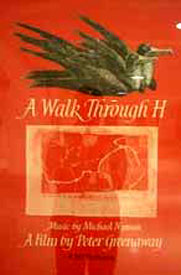 A Walk Through H is subtitled "the reincarnation of an ornithologist," which alludes to his father's occupation. The film doesn't explain its title or subtitle until the final shot of a reveals-all book. A Walk Through H is subtitled "the reincarnation of an ornithologist," which alludes to his father's occupation. The film doesn't explain its title or subtitle until the final shot of a reveals-all book.
The camera moves slowly through a two-room gallery of drawings. An annoying narrator (Colin Cantlie) with stentorial self-importance gives some superficial commentaries about the collection of drawings, including one he personally stole, & they seem to have quite a varied origin, though by their look they're in actuality all by the same artist. By Peter Greenaway in fact.
The music on the soundtrack (by Michael Nyman) is a speeded up version of what works so much better in A Zed & Two Noughts.
We're to understand the drawings are consecutive maps & if followed properly there will be an answer as to what "H" means at the end of the journey, though we're warned in advance that this revelation won't matter, & it won't.
Greenaway's drawing's aren't bad, but they're not good enough to look at in extreme close-up for forty minutes either. As the camera pans through the collection & the narrator drivels on & on sometimes wittily always nonsensically, it goes on a half-hour too long to be anything but a crushing bore.
The kindest reviewers (or those unwilling to risk looking like philistines for not liking "art" even if they furtively suspect it's pretty much garbage) have said only that in the early short films you can see the obsessions of Greenaway's later films already in play.
This one's fixation on cartography & numbered drawings can be seen in sundry of his later films, including his awful feature Drowning by Numbers (1988).
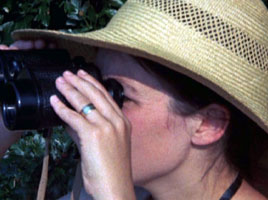 H is for House is a mite more tolerable because shorter. With its archetectural photography & Vivaldi soundtrack, this one has a visual & audio relationship to his excellent Draughtman's Contract, except in the short film there is no excellence. So the more appropos comparison might be to his most lumbering failure Belly of the Architect (1987). H is for House is a mite more tolerable because shorter. With its archetectural photography & Vivaldi soundtrack, this one has a visual & audio relationship to his excellent Draughtman's Contract, except in the short film there is no excellence. So the more appropos comparison might be to his most lumbering failure Belly of the Architect (1987).
To a string of rural estate portraits, we hear the annoying narrator listing what "H" stands for: House, Horror, Holocaust, His Holiness...on & on in the same way that a two year old child might list all the words that rhym with "at." This film is absolute drivel. Terrible!
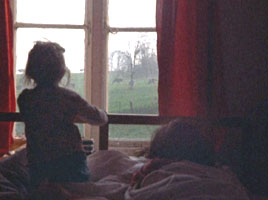 More architectural photography afflicts Windows, again to classical music (on harpsicord, another "H" word). A narrator talks about statistics from the county of W on deaths by falls from windows. More architectural photography afflicts Windows, again to classical music (on harpsicord, another "H" word). A narrator talks about statistics from the county of W on deaths by falls from windows.
These short films have been terribly monotonous & not especially creative visually. The narrations are slightly better than the filming but that's like saying horse apples smell better than cat turds, since the narrative texts are in the main ridiculous.
From Greenaway's self-interviewing documentary among the extras, Greenaway on Greenaway (2002), we learn that the inspiration for Windows was political assassinations in white South Africa during a time when numerous activists or detainees were "accidentally" pitched out of windows, therefore Windows is a political metaphore. But nothing of the sort will be be detected in this assinine film. As well to claim that picking one's nose is a metaphore for the sufferings in the diamond mines.
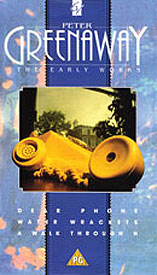 I have an almost endless tolerance & selective liking for experimental films & have many favorites from the avant garde & primitive filmmakers generally, which is why the Weird Wild Realm reviews so many films of the type. I have an almost endless tolerance & selective liking for experimental films & have many favorites from the avant garde & primitive filmmakers generally, which is why the Weird Wild Realm reviews so many films of the type.
Greenaway alas comes nowhere near the best nor even the most foolish (even being most foolish can have its charm). There's simply nothing here that appeals.
There were more short films on the disc but I only fast-forwarded the Intervals which looked like an improvement over the first three but still not good enough; I won't attempt to review it from such a quick scan. I didn't even glance at the rest, as there's too much of actual interest waiting to be viewed & only so many hours in a lifetime.
I almost regret watching as many of them as I did. Formerly I was able to get through the most anal & narratively stupid of Greenaway's feature films by remembering how absolutely brilliant Z.O.O. & Draughtman's Contract were, always looking for the moments of genius in the whelter of moronic in too many of his films.
But now I fear it will be the ineptitudes that stand out, now that the early shorts have provided me with the template for understanding why so many of his films, for all their visual excesses & moments of beauty, tend toward the agonizingly tedius.
Greenaway's notorious refusal to present coherent stories is a cheat when his films present illusions of narrative form & even rely on the bandaid or crutch of having narrators. Too many of his "mature" films just meander without purpose or sense.
The forward momentum which authentic narrative drive provides is not something he has found his way around with any functional replacement. He's like a train conductor who decided the rails restrict what is possible with a locomotive, & so crashes it over a cliff all the while whinging, "I can't live by your rules!"
The short films underscore the amateurism invested even in his mature works, whereas the visual excellence of the mature works would otherwise trick the viewer into thinking the films surely must be great even if boring & the viewers must be the ones who are dense not to understand any of it.
There's seriously nothing to understand. And if you're not carried away by the incohesive pictoriality of his feature films, you won't be sufficiently rewarded by much or any of it. And that's the suspicion the short films unfortunately reveal as indeed the case. To see this kind of cinematic deconstruction done right, one needs to look closely at the best of David Lynch.
Or considerThe Sargasso Manuscript (1965) which uses a convoluted structure that is worth attempting to puzzle out because meaning really is there, much as Greenaway's one true masterpiece A Zed & Two Noughts is a twisted parable that does slowly reveal an over-riding & secretly coherent vision if you work at following it. This cannot be said of many of the films that would follow.
Those of us who've noticed the emperor is naked have been dismissed by Greenaway as "haughty, barren spinsters" (when you hate someone, always call 'em female), for whom he has no respect or liking. And why should he like 'em, since nobody deluded they're fully clothed is eager to know the truth.
He's perhaps more in tune with reality when he admits to dreaming of renewing the cinematic form but being only a "dwarf on the shoulders of the giants who preceded us. " Where the short films are concerned, "turds in the toilets of the giants" might have been more apropos.
copyright © by Paghat the Ratgirl
|
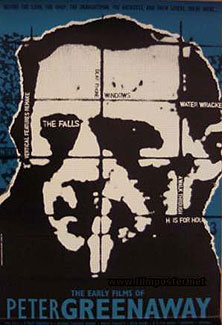

 A Walk Through H is subtitled "the reincarnation of an ornithologist," which alludes to his father's occupation. The film doesn't explain its title or subtitle until the final shot of a reveals-all book.
A Walk Through H is subtitled "the reincarnation of an ornithologist," which alludes to his father's occupation. The film doesn't explain its title or subtitle until the final shot of a reveals-all book.
 More architectural photography afflicts Windows, again to classical music (on harpsicord, another "H" word). A narrator talks about statistics from the county of W on deaths by falls from windows.
More architectural photography afflicts Windows, again to classical music (on harpsicord, another "H" word). A narrator talks about statistics from the county of W on deaths by falls from windows.